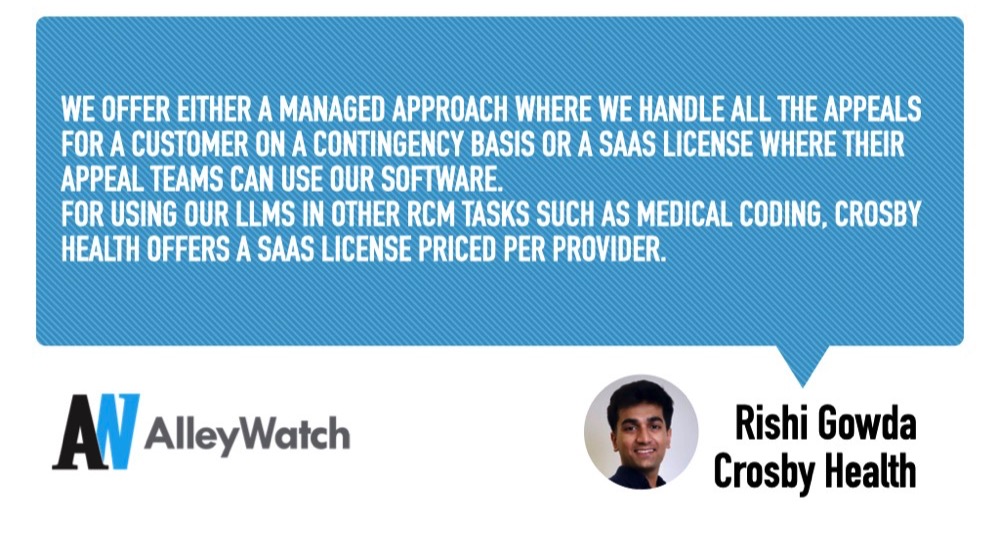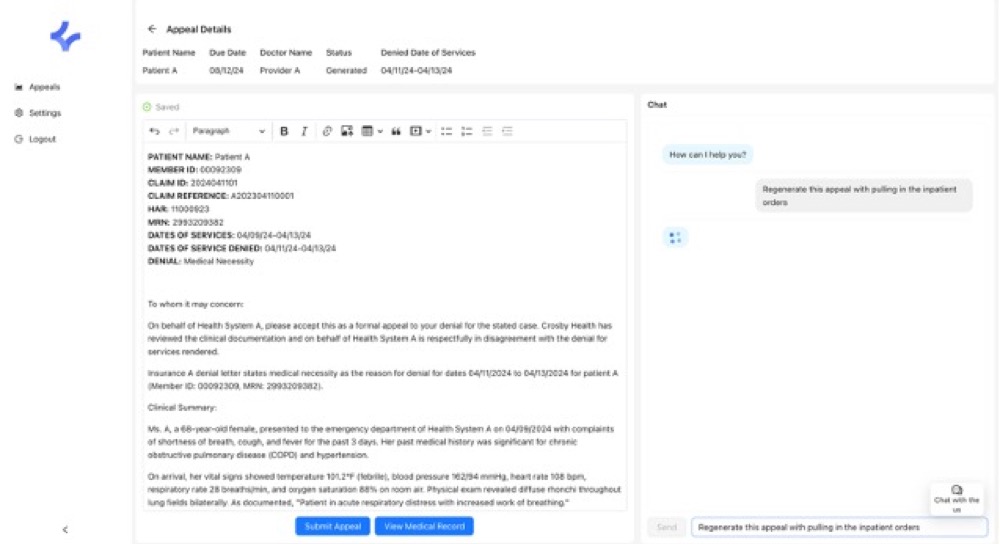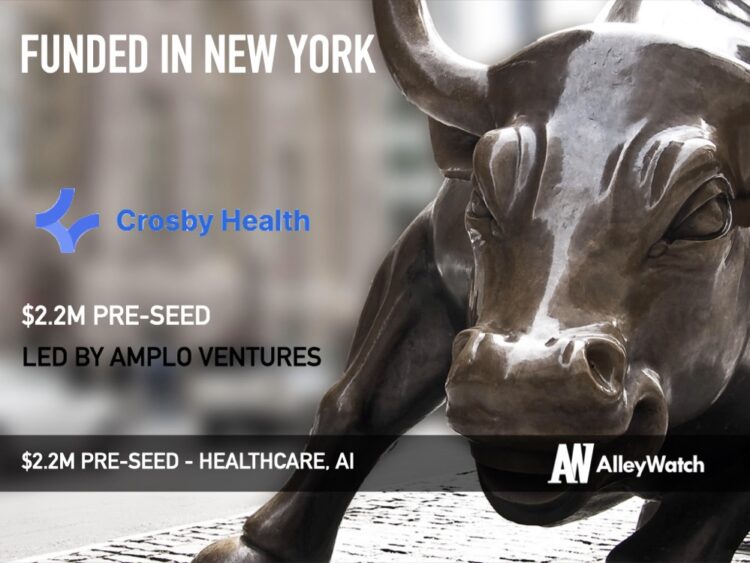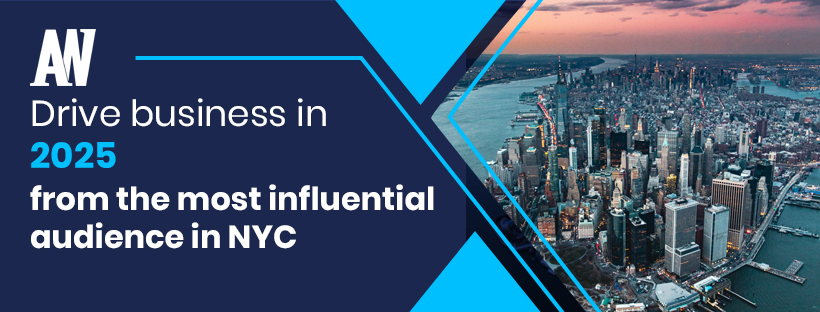Claims denials by insurers are a major source of revenue loss for healthcare providers. Nearly 20% of all claims for medical practices are denied, and alarmingly, up to 60% of these are never resubmitted for payment. Hospitals face a similar predicament, with 10% of claims being initially rejected. This results in hospitals spending $20B annually in managing claims denials. Crosby Health is a health tech company that’s built a sophisticated large language model (LLM), Apollo, to streamline back-office operations for healthcare providers including claim denial management, medical coding, and chart reviews. The team at Crosby has built such a robust model that it’s scoring 91.8% on medical licensing board examinations, outperforming any clinical LLMs available presently. By introducing automation to the claims denials workflow, the platform frees healthcare providers to focus on delivering clinical care rather than being burdened with tedious administrative tasks. Partners using the platform are appealing denials 300% faster than before. Apollo is available as a managed approach where Crosby handles the entire claims denial process from the initial appeals letter to supporting documentation or as a SaaS license where users pay to access the software.
AlleyWatch caught up with Crosby Health CEO Rishi Gowda to learn more about the business, the company’s strategic plans, recent round of funding, and much, much more…
Who were your investors and how much did you raise?
Crosby Health raised $2.2M in pre-seed funding led by Amplo Ventures, with participation from NOMO Ventures and angel investors.
Tell us about the product or service that Crosby Health offers.
Crosby Health is a health tech company automating administrative tasks through its clinical large language model (LLM), Apollo. Crosby Health’s newly launched Apollo boasts innovative use cases through the analysis of unstructured clinical documentation. Apollo automates clinical appeals from start to finish, from generating the initial appeal to submitting and tracking results, in addition to supporting medical coding and chart auditing.
When compared to leading clinical AI models, Google’s Med-PaLM 2 and Meditron, Apollo continues to outperform the market leaders. When tested through PubMedQA (a yes/no/maybe exam based on medical papers), MedMCQA (nearly 200K questions covering two thousand healthcare topics), multiple categories of the multiple choice clinical knowledge exam (MMLU) and the MedQA Licensing Exam, Apollo consistently scored higher than MedPaLM 2 and Meditron. Against Chat GPT4, with both models using MedPrompt Re, Apollo either met or beat GPT 4.
What inspired the start of Crosby Health?
I’ve been obsessed with solving healthcare workflow and financial problems since I was a child. My mom was a nephrologist and started a private practice when I was 12 years old. My dad was an engineer and he quit his job to join forces with my mom and make it our family business. I would always see payment denials come through and I was hooked on the process. I spent summers, weekends, and after school obsessing and solving the denial pain points I felt firsthand. I used to manually log every reason for denial and analyze droves of clinical data in my free time, trying to uncover why denials happen and how to prevent them. I painstakingly realized that clinical documentation was the source of truth for how things got paid. If I wanted to solve a major financial problem plaguing the US healthcare system, I had to build technology that could ingest and analyze clinical notes. Always wanting to start a company, I came to NYU to learn everything I could to successfully solve the same problems for every provider in the country. I dove deep into company building, taking on growth and operating roles at different startups from seed to Series A and talking to as many customers/healthcare providers as possible before meeting Louis and Suhas to start Crosby Health.
How is Crosby Health different?
What makes Crosby Health different is with a context window of over 200k, Apollo presents the most advanced clinical LLM to date, achieving an impressive 91.8% score on medical license board exam questions, outperforming every clinical LLM available today.
What market does Crosby Health target and how big is it?
Crosby Health offers Apollo’s capabilities to healthcare providers both via onboarding them to its denial management platform or partnering for organization-specific use-cases (medical coding, auditing, etc.). Hospitals spend nearly $20B annually combating claim denials, with half of these denials being overturned after a strenuous appeals process, equating to $10B spent to overturn incorrect denials. Apollo’s clinical-grade AI jumpstarts healthcare providers to pursue 100% of denials, rather than selectively choosing which to appeal. Beyond claim denial management, Apollo also supports AI medical coding, chart reviews, and more, ultimately unlocking more revenue for healthcare providers while repurposing clinicians to where they are needed most. Since licensing Apollo, community wellness-focused startup EmpowerMe is appealing denials 300% faster than traditional, human efforts. Our clinicians are needed for patient care, and Crosby Health is tackling the specific administrative areas that take providers away from patients.
What’s your business model?
We offer either a managed approach where we handle all the appeals for a customer on a contingency basis or a SaaS license where their appeal teams can use our software.
For using our LLMs in other RCM tasks such as medical coding, Crosby Health offers a SaaS license priced per provider.

How are you preparing for a potential economic slowdown?
The nature of our business is to work even better with an economic slowdown. Our two core KPIs are how much we can increase team efficiency and increase dollars recovered for providers. Working together, these results uniquely position organizations in a recession to have better financial performance in the face of mounting pressure.
What was the funding process like?
Very arduous but rewarding. We had a lot of help along the way from early supporters and angel investors. As first-time entrepreneurs, we had to learn a lot very quickly in order to understand how to run an efficient process. Initially, we had no set process and only spoke to investors when and if we could. It took a few attempts to figure out what we needed to do to achieve our goal.
What are the biggest challenges that you faced while raising capital?
We are building in an industry that has been flooded with point solutions over the last few years. We were fighting an uphill battle to showcase how our vision can do it all, automating the entire revenue cycle stack.
What factors about your business led your investors to write the check?
In the earliest stages, investors invest based on entrepreneurs and the problem you are solving. We are applying extremely novel approaches to automating the billions of spend in a niche part of healthcare, but we, and our investors, know it doesn’t stop there.

What are the milestones you plan to achieve in the next six months?
We plan on utilizing Amplo Ventures’s investment to accelerate Crosby Health’s overarching mission to revamp denial management and revenue cycle management (RCM) in healthcare through automation.
What advice can you offer companies in New York that do not have a fresh injection of capital in the bank?
Build, iterate, test, and make sure you have a playbook that can be affected by an infusion of cash. Too many companies raise too early without having a clear, thought-out roadmap. Roadmaps always change – but having something to put the capital towards that’s systematic creates an anchor to iterate upon.
Where do you see the company going now over the near term?
We’re working to secure more partnerships and implement Apollo with thousands of providers and systems. The next few quarters are solely focused on leveraging these partnerships to create an unparalleled product and scalable GTM.
What’s your favorite restaurant in the city?
Ambra in the West Village.





